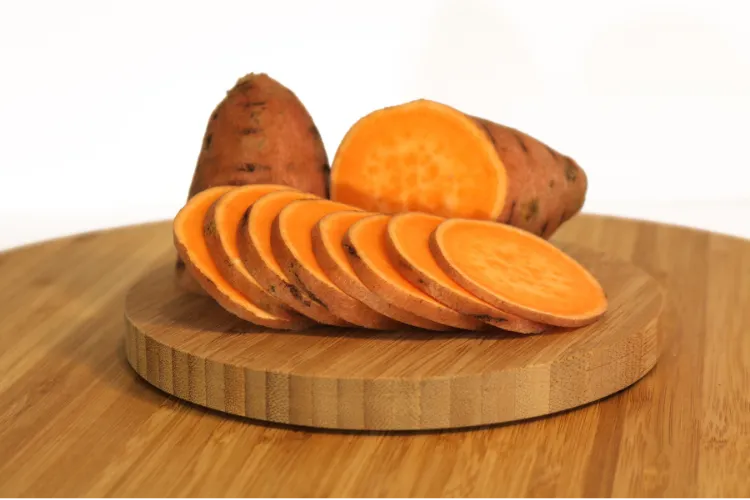Why You Need to Add Sweet Potatoes to Your Diet NOW

As one of the most common root vegetables found worldwide, sweet potato is a favorite among many. It may look nondescript compared to others, but its many varieties are all rich in fiber, minerals, vitamins, and antioxidants which are all highly beneficial to our overall health. Needless to say, if there’s one food that you should be adding to your diet—especially if you’re trying to lose weight or switch to a healthier lifestyle, sweet potato should be on your list.
QUICK FACT: If you’re looking for a great source of beta-carotene, but have grown tired of munching on carrots, give orange-fleshed sweet potatoes a try! Its beta-carotene content can be converted to vitamin A, which is essential for both gut health and a stronger immune system.
With that in mind, let’s talk about the first of its many surprising health benefits:
It can strengthen your immune system
As we’ve established, vitamin A is important when it comes to maintaining a healthy immune system. It also aids in keeping our gut healthy, especially when it comes to the mucous membranes in its lining. A healthy gut is essential to our overall health, given the fact that it’s exposed to a slew of pathogens that can potentially bring about all sorts of diseases. Wasn’t it said before that a healthy gut is key to good health?
By constantly supplementing your body with vitamin A from natural sources such as sweet potatoes, you can help decrease gut inflammation and improve your immune system’s ability to deal with any potential threats.
Can help boost brain function
Aside from being rich in antioxidants, purple sweet potatoes also contain anthocyanins which are known to aid in preventing free radical damage as well as reducing inflammation when it comes to our brains. Adding it to your diet can also boost your memory and enhance your learning abilities—an effect that’s attributed to its antioxidant properties.
Note that these studies have only been done on animals, particularly in mice, but the general consensus is that diets that are rich in fruits and vegetables leads to higher antioxidants in our body. This results in a 13% decrease in our risk of developing dementia and mental decline.
Aids in maintaining healthy vision.
Going back to beta-carotene, orange and purple sweet potatoes are known to contain anthocyanins that can help with protecting our eye cells from damage. In fact, 200 grams of baked orange sweet potato skins contain enough beta-carotene to provide for an adult’s daily needs.
Without vitamin A, we could develop a type of blindness called xerophthalmia—this is a common issue in developing countries where there are severe vitamin A deficiencies. This is also why we need to supplement our diets with more beta-carotene as vitamin A is essential to forming light-detecting receptors in our eyes.
Can offer protection against certain types of cancers
We’ve already emphasized the antioxidant content of sweet potatoes and how they can protect our bodies from free radical damage. In the same vein, it can also protect us from certain types of cancers.
Through test-tube tests, the antioxidants found in purple sweet potatoes have been shown to help with slowing down the growth of certain cancer cells—including those of the breast, bladder, stomach, and colon. These same effects were also apparent in mice fed with a diet that was rich in purple sweet potatoes. The results showed reduced levels of early-stage colon cancer, pointing to the protective effects of anthocyanins in sweet potatoes.
Aside from eating the root crop itself, extracts from orange sweet potato and its peels have also been seen to contain anti-cancer properties. Note that these effects have yet to be tested on humans.
Promotes gut health
Sweet potatoes are known for being great sources of fiber, particularly two different types: soluble and insoluble. Our bodies cannot digest both, so they stay in our digestive tract where they can provide different gut-health benefits.
These fibers are fermented by the bacteria in our colon, which results in the creation of short-chain fatty acids that help with fueling the cells in our intestinal lining. This helps keep these cells strong and healthy. Aside from this, the soluble fibers in our diet also help with absorbing water and softening our stool. If you’re constantly constipated or have trouble with bowel movements, you need to supplement your diet with more fiber.
That said, diets that are rich in fiber (about 20 to 33 grams per day) are associated with reduced risks of colon cancer. The antioxidant content of sweet potatoes is also known to promote the growth of healthy bacteria in our gut, the same ones we could get from probiotics: lactobacillus and bifidobacterium species.
It’s incredibly nutritious
You already know that sweet potatoes are great sources of fiber as well as essential vitamins and minerals, protecting our bodies from free radicals that can damage our DNA and induce inflammation. So whilst you might see these starchy root veggies as plain and maybe even unappetizing, they still pack a punch when it comes to fighting all sorts of illnesses including heart disease, cancer, and even slow down aging.
I’ve got the numbers to back that statement up. For every 200 grams of baked potato with skin, you get:
- Calories: 180
- Protein: 4 grams
- Carbs: 41.4 grams
- Fat: 0.3 grams
- Fiber: 6.6 grams
- Vitamin C: 65% of the DV
- Vitamin A: 769% of the DV
- Vitamin B6: 29% of the DV
- Manganese: 50% of the DV
- Pantothenic Acid: 18% of the DV
- Potassium: 27% of the DV
- Niacin: 15% of the DV
- Copper: 16% of the DV
*DV: Daily Value
Tips on Adding More Sweet Potatoes to Your Everyday Diet:
Aside from being one of the most common root vegetables available, sweet potatoes are also very versatile and can be added to your diet in a variety of ways. You can roast them, bake, fry, boil, steam, or even pan-cook them. They can also be enjoyed as a dessert, often sweetened with a bit of honey or milk. They can be turned into cakes or savory dishes— it all depends on how you season and prepare them.
If you’re looking for a healthier alternative to your usual snack of potato chips and French fries, sweet potatoes can replace both without compromising the taste. Needless to say, it’s a food item that every pantry needs.
So, what else can you make using sweet potatoes?
- Sweet potato toast: Just cut them up into thin slices then toast each one. This can be topped with your choice of nut butter, but it goes best with some avocado.
- Sweet potato fries: The healthier alternative to your usual potato ones. Julienne the pieces or cut them up into wedges—if you want to cut down on the grease, baking them is the way to go.
- Sweet potato chips: The thinner, the crisper it will be. I would usually suggest that you fry them up for this purpose, but baking should deliver the same results. Season or flavor it as you see fit. My favorite is glazing the chips with some honey.
- Mashed sweet potatoes: The tastier version of your regular mash. The process is the same as well.
- Sweet potato hash: I wouldn’t normally get rid of the skins on these, but for this recipe, peeled ones work best. Dice the sweet potatoes and cook it up with some onions in a pan. The caramelization will bring out its sweetness nicely.
- Baked sweet potatoes: One of the best things about sweet potatoes is that they are already flavorful even when you haven’t seasoned them. So for this recipe, all you really need to do is place them whole in the oven and bake until they turn tender.
- Baked goods: This involves pureeing the sweet potatoes and then adding them to your dough. This adds moisture to your cakes, but without the extra fat.
- Spiral sweet potatoes: If you’re looking to give it a bit more flair, just cut them into spirals then sautee the pieces. Top with your choice of dressing or sauce then serve. It’s quick yet delicious.
One thing to note is that adding a bit more fat to your diet isn’t always bad—not if you’re using healthy sources for it. When preparing sweet potatoes, especially if you’re frying them, use avocado oil, coconut oil, or olive oil. Not only are these better for your body, they can also help with enhancing its ability to absorb beta-carotene since it’s a fat-soluble nutrient.
Does heat affect its nutrient content?
Truth be told, it does reduce its beta-carotene content. However, it doesn’t completely remove it—the sweet potatoes will keep 70% of their nutrient content even after cooking.
Is it a healthy diet food?
It certainly is! Rich in different nutrients, vitamins, minerals, and antioxidants but without the added fat? It will keep you feeling full for hours, so having sweet potatoes during meals can help you cut down on cravings as well.
If you’re looking for something that’s both delicious and packed with good stuff, give sweet potatoes a try.
